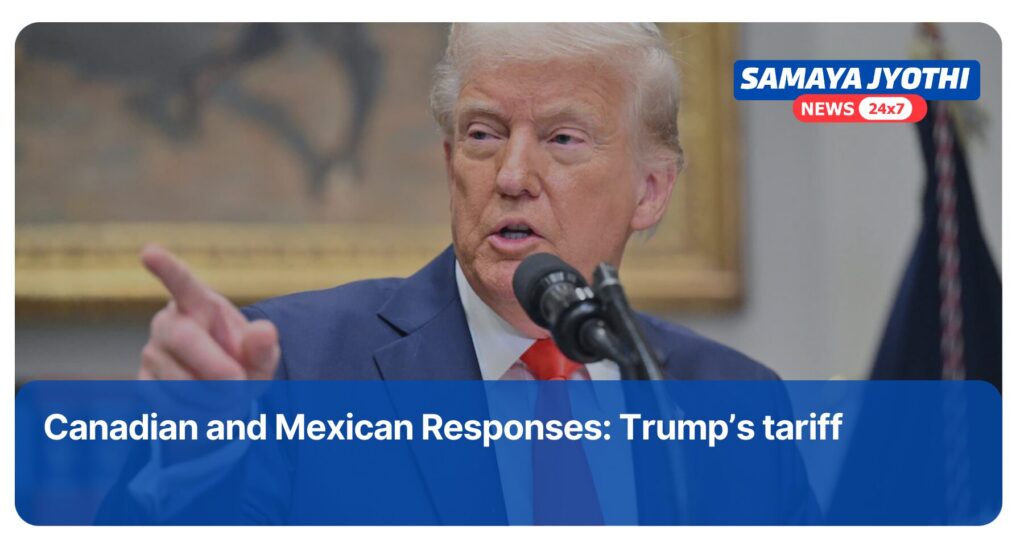- Home
- International, Latest News
- Trump Delays Canada, Mexico Tariffs After Market Blowback
US President Donald Trump Postpones Tariffs on Canadian and Mexican Imports Amid Market Concerns
Washington: US President Donald Trump announced on Thursday that he would delay certain tariffs on Canadian and Mexican imports after financial markets reacted negatively to the initial tariff implementation. The move has led Canada to suspend a planned wave of countermeasures, bringing a temporary respite to businesses and consumers affected by the trade dispute.
The tariffs, which took effect on Tuesday, imposed duties of up to 25 percent, causing stock markets to tumble. Economists warned that such broad levies could hinder US economic growth and escalate inflation. However, Trump signed orders on Thursday to postpone new tariffs under the North American trade agreement until April 2, despite dismissing claims that market turmoil influenced his decision.
Relief for the Auto Industry
The temporary halt provides relief to automakers, as North American auto parts cross borders multiple times during production. After discussions with the “Big Three” US automakers—Stellantis, Ford, and General Motors—the administration initially granted a one-month exemption for autos under the United States-Mexico-Canada Agreement (USMCA).
A White House official stated that about 62 percent of Canadian imports would still be subjected to the new tariffs, mainly energy products taxed at a lower 10 percent rate. Meanwhile, approximately half of Mexican imports pass through the USMCA framework, making them subject to potential levies.
Trump insisted that additional tariffs will take effect on April 2 and emphasized their “reciprocal nature.” His administration has consistently pushed for tariff measures to counter what Washington perceives as unfair trade practices.
Canadian and Mexican Responses
Following Trump’s decision, Canadian Finance Minister Dominic LeBlanc took to X (formerly Twitter) to announce that Canada would suspend its second wave of retaliatory tariffs, originally set to target $125 billion worth of US products. He stated that Canada would continue negotiating for the complete removal of tariffs.
Despite the reprieve, Canadian Prime Minister Justin Trudeau acknowledged that trade tensions with Washington would persist. “Our goal remains to get all tariffs removed,” Trudeau remarked, signaling that Ottawa would continue advocating for free trade.
Meanwhile, US-Mexico relations saw a more positive turn as Trump described his conversation with Mexican President Claudia Sheinbaum as “very good.” He claimed “tremendous progress” had been made in addressing illegal immigration and drug trafficking—two key factors cited by Washington for imposing tariffs on Mexico, Canada, and China.
Impact on Global Trade and Economic Reality
While Trump maintains that tariffs serve as a revenue source for the US government and a tool to correct trade imbalances, experts caution against their long-term effects. Scott Lincicome, vice president of general economics at the Cato Institute, described the decision to ease tariffs as “a recognition of economic reality.” He noted that tariffs disrupt supply chains, burden American consumers, and create uncertainty in financial markets.
US Treasury Secretary Scott Bessent downplayed inflationary concerns related to the tariffs, stating that any price impacts would be temporary. He defended Trump’s stance, arguing that “access to cheap goods is not the essence of the American Dream,” and emphasized the importance of economic security over low-cost imports.
Despite these assurances, US stock markets continued to decline on Thursday, reflecting investor skepticism about the broader implications of Trump’s trade policies. Meanwhile, the US trade deficit surged to a record $131.4 billion in January, with analysts suggesting that businesses may have rushed to import goods ahead of anticipated tariffs.
As the April 2 deadline approaches, Canada, Mexico, and US industries will closely monitor the administration’s next move, preparing for potential shifts in trade relations and economic policies.
Click for more latest news. Also get top headlines and latest news from India and around the world at samaya jyothi










